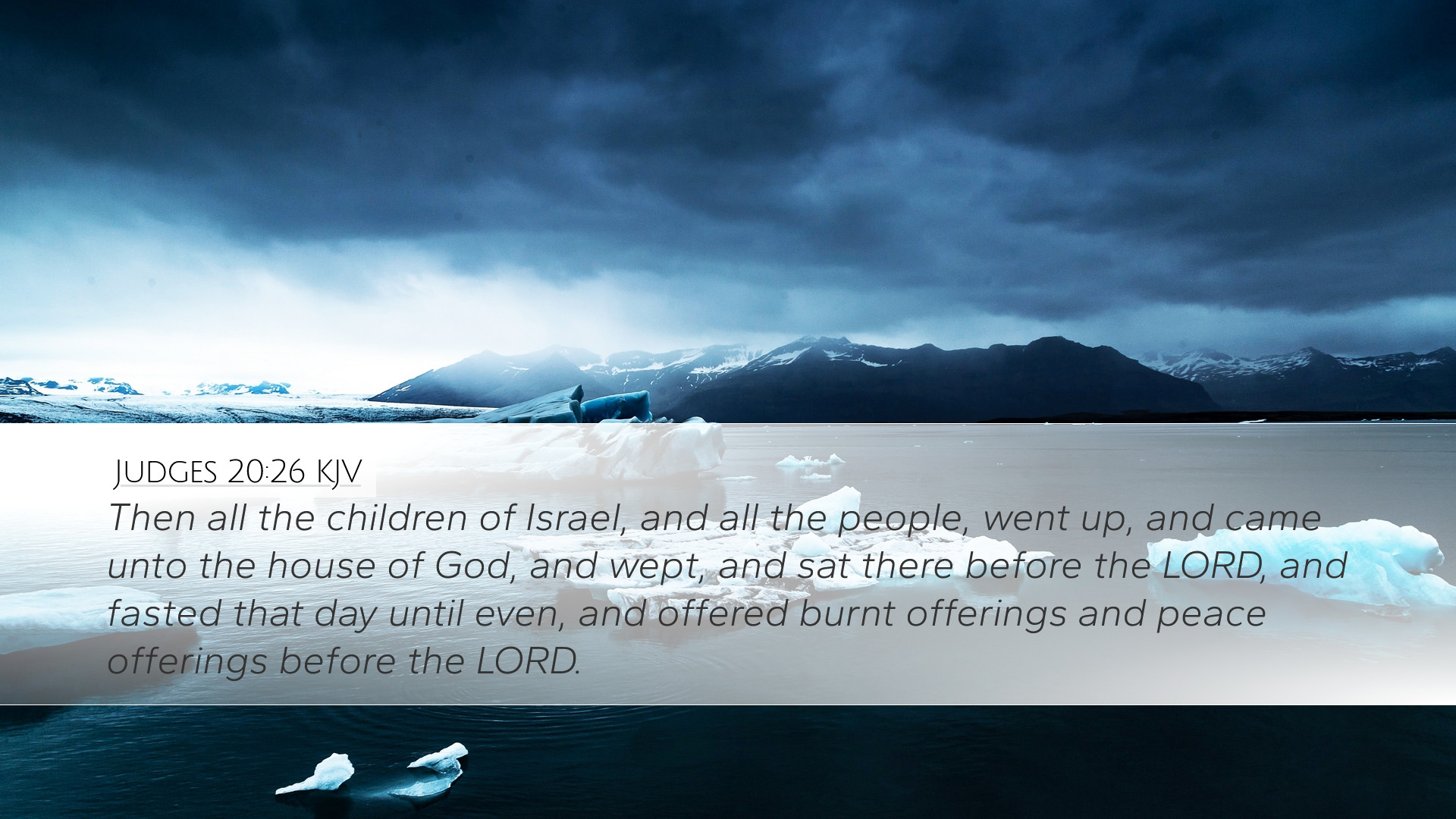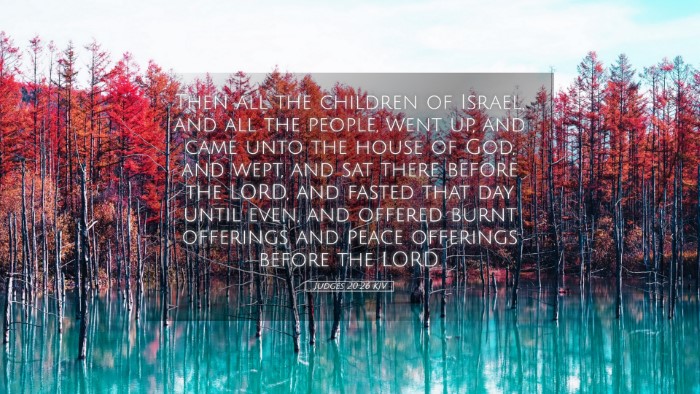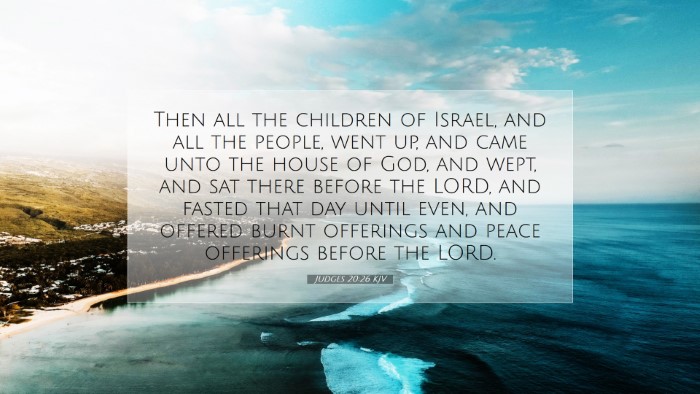Bible Commentary on Judges 20:26
Judges 20:26 states: "Then all the children of Israel, and all the people, went up, and came unto the house of God, and wept, and sat there before the LORD, and fasted that day until evening, and offered burnt offerings and peace offerings before the LORD." This verse reveals a poignant moment of national mourning, repentance, and seeking divine guidance in the context of Israel's tumultuous history.
Context and Background
The preceding chapters detail one of the most horrific civil conflicts in Israel's history, centering around the tribe of Benjamin after a grave atrocity was committed against a Levite's concubine in Gibeah. The brutal outcome saw the tribe of Benjamin devastated, leading both to tragedy and reflection among the tribes of Israel. The dire circumstances set up a backdrop for the emotional and spiritual state represented in this verse.
The Significance of Mourning
-
Mourning as a Response to Sin:
Matthew Henry comments on the collective anguish expressed here, indicating that it was a vital reaction to their collective sin and the sorrow over their loss. The mourning served to recognize their shared guilt and the consequences of their actions.
-
Emphasis on Spirituality:
Albert Barnes emphasizes that the tears and lamentations expressed a deep contrition before the Lord, underlining the importance of emotional engagement in worship. They understood that their dependence on God was crucial in a time of crisis.
-
Public vs. Private Grief:
Adam Clarke notes that the gathering at the house of God highlights an essential communal aspect of worship and penitence, distinguishing between private sorrow and the corporate engagement in seeking divine favor.
Fasting as a Spiritual Discipline
In the context of this verse, fasting is a profound act of humility and supplication. The Israelites fasted until evening, indicating an earnest desire to seek God's mercy and aid. This act reflects a deep understanding of fasting not merely as an abstention from food but as an intimate expression of seeking intimacy with God.
The Role of Fasting in Prayer
-
Henry on Fasting:
Henry highlights fasting as an important spiritual discipline that accompanies prayer, enhancing the act of seeking God. The Israelites engaged not only in external demonstration but also in an internal search for reconciliation with God.
-
Barnes on Divine Acknowledgment:
Barnes observes that this collective fasting indicated earnestness in their supplication, showcasing their commitment to seeking divine counsel. Fasting was a way to align their hearts with the Lord’s will.
-
Clarke on the Heart's Posture:
Clarke points out that fasting is effective only when the heart is rightly positioned before God, suggesting that God desires sincerity over ritualistic observances.
Burnt Offerings and Peace Offerings
The offerings mentioned are critical components of their worship and serve as both acts of contrition and attempts to re-establish a covenant relationship with God. These acts demonstrate acknowledgement of God's holiness and the seriousness of sin committed among them.
Symbolism of Offerings
-
Matthew Henry on the Offerings:
Henry explains that burnt offerings symbolized total consecration to God, while peace offerings conveyed gratitude and a desire for harmony with God.
-
Barnes on the Nature of Peace with God:
Barnes notes that the offerings were a plea for peace, indicating a desire for reconciliation with both God and one another, showcasing the communal aspect of worship in healing fractured relationships.
-
Clarke’s Insight on Offering Significance:
Clarke adds that these sacrifices not only represented humility before God but also reflected a hope for restoration and peace following a tumultuous period.
Theological Implications
This narrative leads to profound theological implications concerning repentance, community, and God’s grace. The Israelites’ acknowledgment of their collective sinfulness and their communal efforts towards repentance evoke a model for contemporary Christian practice. It brings forth the following key theological points:
-
Collective Responsibility:
The need for corporate acknowledgment of sin and the importance of communal penitence in seeking restoration and guidance.
-
Role of Divine Intervention:
The belief that genuine repentance and seeking of God can lead to divine help and restoration, emphasizing the character of God as responsive to those who seek Him earnestly.
-
Authentic Worship Practices:
A reminder of the heart behind worship practices, suggesting that true worship is more about the state of the heart than the rituals performed.
Conclusion
In Judges 20:26, we find a profound narrative that illustrates the gravity of sin and the importance of seeking God through mourning, fasting, and offerings. The Israelites served as a model of how communities can come together in search of divine favor, reconciled relationships, and restored hope amidst despair. As pastors, students, theologians, and scholars explore this text, the insights drawn from historical and theological perspectives can enrich our understanding of both ancient and contemporary faith practices.


